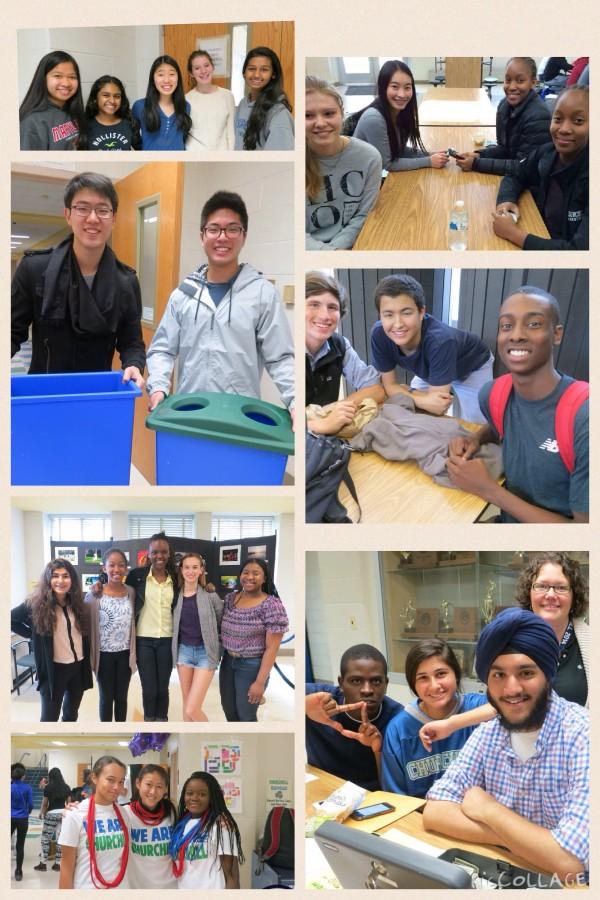MCPS works to create ‘I, too, am MCPS’ video
March 23, 2015
These days, it seems like the world has too many problems and there is nothing kids can do about it. Controversial issues like feminism and racial discrimination can barely be discussed in the adult world without whispers and immediate judgment, so it may seem like kids can’t do anything but live in the world that’s been created for them.
However, B-CC seniors Makde Hailu and Orlando Pinder didn’t let that stand in their way. Instead, the students created “I, Too, am B-CC,” a video detailing the challenges of being a black or Hispanic student in MCPS.
The video is based off of a similar “I, Too, am Harvard” video, where minority students revealed startling facts about being faced with racism on campus.
“When I say that I’m half black, they’re like, ‘Well, that’s obvious. But what are you?’” a biracial Harvard student said in the video. “Then when I say I’m half white, they’re like, ‘Really?’ I’m the whole package—I’m not just one and not just the other.”
The video sparked a fire in students across the nation who have also had to deal with discrimination. Within months, “I, Too, am Cambridge” and “I, Too, am MIT” were released, and Jan. 17 brought “I, Too, am B-CC.”
“The campaign on the Ivy League campus aimed to expose the harm of racial stereotypes and ratify the spot that minorities earned there,” said B-CC senior and producer Makdes Hailu. “We took that idea of the harm of racial stereotypes and applied it to the achievement gap here.”
According to fellow B-CC producer and senior Orlando Pinder, who is also featured in the video, the string of “I, Too” videos as well as activist movements like “‘Black Lives Matter’ started the conversation, and we’re just trying to carry it on.”
Though CHS is diverse and accepting, many students have encountered similar situations.
“One time, when I was in fourth grade, walking home from school with my little brother, and someone yelled at us to ‘Go back to our own country,'” junior Neha Kaul said. “I was so confused—we were born here.”
CHS students feel that it is an important conversation that needs to continue.
“America is known as a melting pot, so we need to truly be one and learn to respect other cultures and nationalities,” junior Maya Kohli said.
Now an “I, Too, am MCPS” video is in progress. The plan is still in its preliminary stages, but progress reports indicate that it will be similar to the “I, Too, am B-CC” video.
“The purpose is similar,” Hailu said it aims to expose the harm of racial stereotypes, bring awareness to the achievement gap, and propose solutions to these problems
The “I, Too, am MCPS” video is working through the Minority Scholars Program (MSP), which works to spread awareness about the achievement gap and encourage academic achievement. Though CHS is not currently a part of the MSP, it is looking to join soon.
“We have had active conversations about joining the program,” assistant principal Brandi Richardson said. “In the meantime, we have other programs to recognize our diverse community, such as Shades of Elegance and the International Student Association.”
Producers hope to include schools from all over the county to expand the movement and tackle racism in an educational environment.
“It’s relevant and affects classmates and friends,” Pinder said. “In places like Montgomery County, it’s harder to fight because it’s not as obvious as someone hitting me. Sometimes I would prefer that because it’s a lot easier to point and say, ‘That’s an issue.’ The stuff we see isn’t as obvious and will be denied as being a racial thing.”
“I, Too, am MCPS” will provide such students with a way to express their feelings and spread awareness of subtle, everyday forms of racism.
“We want to shed light on the reality that some students experience,” Richardson said. “By showing awareness, we can move towards embracing our similarities instead of highlighting our differences.”
“I, Too, am MCPS” will provide students with an opportunity to confront the issue and spread awareness about racism.
“To many, it might seem like the issue of racial discrimination isn’t something that poses tangible problems—but it does,” Hailu said. “It’s time we address this for what it is by tackling it head on with an exposé instead of beating around the bush like we’ve done for so long. By addressing this problem as a county, we are automatically a step further towards solving it.”


